Victorian Society: 'At-risk' mill, market and department store
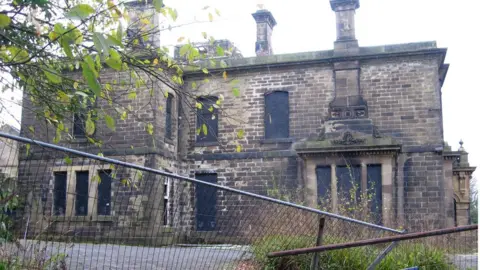 David French
David FrenchA department store, indoor market, and mill are among those named as the most at-risk Victorian buildings in England and Wales.
The Victorian Society on Monday named its top 10 most endangered sites in a new list.
The list features both Victorian and Edwardian buildings the charity deems to be of national importance but facing the prospect of being lost.
The sites also include a farm, a church and a school.
Griff Rhys Jones, president of the Victorian Society, said: "Here we have buildings, crying out for our help, that take us straight to the real history of Victorian society.
"We must save it for coming generations."
Joe O'Donnell, director of The Victorian Society, added: "As always, our list has a wide variety of structures, many of which are recognised through their listing as being nationally important.
"The list and the number of nominations we receive show that, sadly, our Victorian and Edwardian heritage is still under threat from demolition or collapse from neglect."
The full list includes:
Coal Drops, Halifax
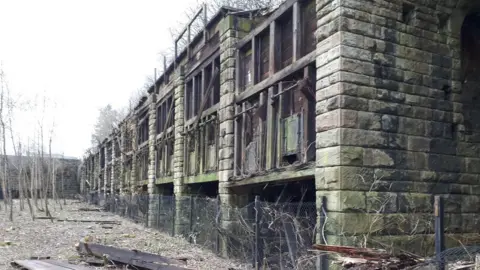 David Witcher
David WitcherHalifax Coal Drops were built for the Ovenden and Halifax Junction Railway Company, comprising 15 wooden bunkers built into the hillside supported between stone piers, The Victorian Society said.
Trains would stop over the top and unload coal into the bunkers, and local traders would back horse-drawn carts into the spaces beneath to load the coal for distribution.
Their relatively intact internal machinery made the drops a "rare and large scale survivor", the charity said, adding the site had been fenced off for 15 years after a piece of masonry fell.
The society said a full structural survey was needed to establish the work necessary to ensure the site's future.

Horncliffe House, Lancashire
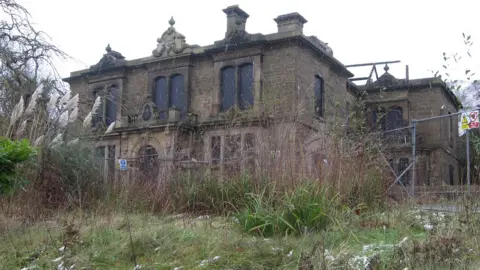 David French
David FrenchOriginally built as a home for businessman and mill owner Henry Hoyle Hardman, Horncliffe House had also served as an old people's home and a hotel before closing in 2007. The house was abandoned following a failed planning application in 2008, the charity said.
In 2019, the site was devastated by a fire. Its exterior is almost all that remains.
The society said the building needed "extensive" works "to save it from total collapse".

Healings Flour Mill and Warehouses, Tewkesbury
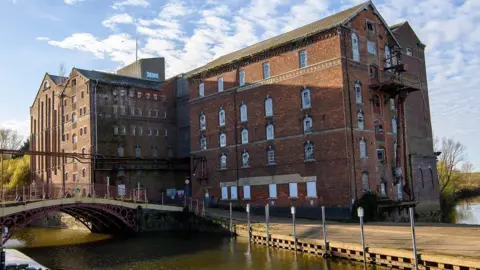 Nicholas Jones
Nicholas JonesAt its peak in 1892, the flour mill was considered to be the largest and most advanced in the country, capable of producing 25 sacks of flour an hour, the society said.
Operations ceased in 2006, and the complex of buildings is derelict.
The listed buildings were unsafe, the group added, and were in need of serious structural work to preclude the possibility of demolition.

Icknield Street School, Birmingham
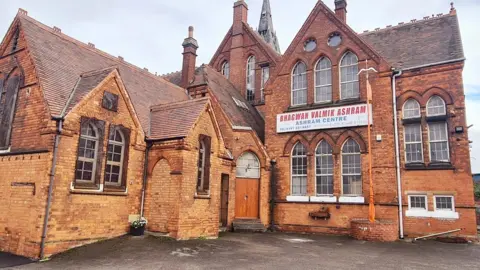 Stephen Hartland
Stephen HartlandPartly used as a Hindu Temple, Icknield Street School was in urgent need of repairs, the society said, adding there were leaks from the slate roofs and gutters, causing damage to walls.
The building was designed by J.H. Chamberlain of Martin and Chamberlain, who created several of Birmingham's Victorian buildings.

Indoor Market, Burslem, Stoke-on-Trent
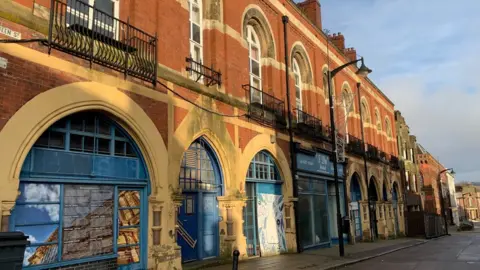 Our Burslem
Our BurslemThe indoor market closed its doors in 2003 after masonry dropped from the ceiling, making it unsafe for shoppers, according to the charity.
It said the council-owned market's iron and glass roof was now in danger of collapse, with the repair bill expected to be close to £1m.

Jones & Higgins Department Store, London
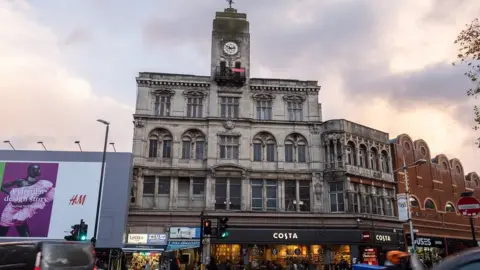 John Cowley
John CowleyThe Jones and Higgins store opened in 1867 on the corner of Rye Lane and Peckham High Street and formed a key part of a Golden Mile of shops.
The clock tower was designed by Southwark architects Henry Jarvis & Sons, who also built Dulwich Hospital and Walworth Town Hall.
The original store closed its doors in 1980 and part of the building has since been demolished to make room for the Aylesham Centre. The rest of the building was taken over by the Peckham Palais nightclub until it closed about 10 years ago.
Although the clock was repaired in 2015, after being out of service since 1980, it had since stopped again, and there was "cause for serious concern" about its future.

Minley Home Farm, Hampshire
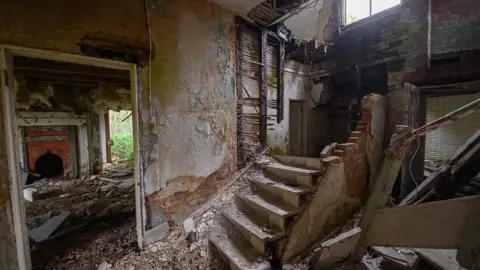 Liam Heatherson
Liam HeathersonMinley Home Farm was once part of the Minley Manor Estate, the society said. While the manor house itself has found new owners, the farm and acres of surrounding land have been owned by the Ministry of Defence (MoD) since 1935.
The farm buildings were now in a precarious state, the charity added, and in January, the MoD submitted plans to demolish the farm.
SAVE Britain's Heritage took legal action to block the demolition under permitted development rights and made a listing application, which the Victorian Society said it was supporting.

Oldham Equitable Cooperative Society (Hill Stores), Oldham
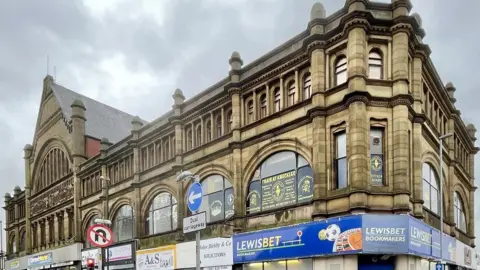 Mark Watson
Mark WatsonCompleted in 1900, the building was designed to include drapery, gentlemen's outfitting, furnishings, boot and shoe plus butchering and grocery departments, as well as offices, committee and board rooms, and an educational department with newsroom and library.
The Victorian Society said the building stood out from other Cooperative Society buildings with its two ballrooms, used in the 1980s as a dance and music venue.
While some shops remained on the ground floor, it said, other rooms were in need of urgent attention.

Church of St Helen, Biscathorpe, Lincolnshire
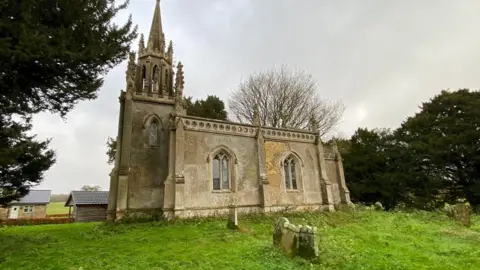 Ben Abel
Ben AbelThe church, rebuilt in 1847 on the site of an older church, retains many original features including stained glass and cast-iron poppy-headed benches.
But absence of regular maintenance over a period of years has left the building in need of repair, and the interior is now partially exposed to the elements, with water getting into the building and causing damage, the society says.

Whitchurch Hospital, Cardiff
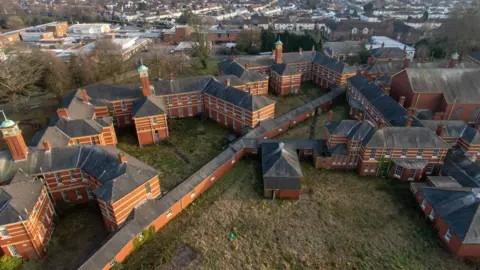 Scrappynw
ScrappynwFirst opened in 1908 as Cardiff Lunatic Asylum, the hospital has been falling into ruin since it closed its doors to patients in 2016.
Plans were submitted to convert the hospital and surrounding grounds to residential, commercial and leisure uses in 1995, "but have never come to fruition", the charity said.
Those plans expired in 2020, with the smaller, longer buildings now a serious concern.

Follow BBC West Midlands on Facebook, Twitter and Instagram. Send your story ideas to: [email protected]
